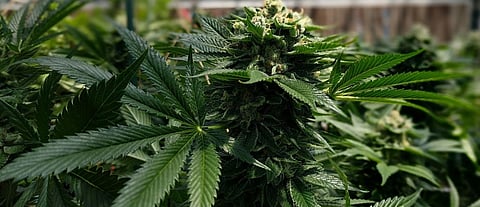

The 21-day nationwide lockdown to curtail the novel coronavirus (COVID-19) outbreak has dealt a blow to several communities. One such community is that of substance abusers, who increasingly face withdrawal symptoms.
Amid the lockdown, substance abusers have been unable to access drugs. Sources working with private rehabilitation centres and users who overcame addiction told DTE that following lockdown, supply chain of opioids like chitta, heroin and brown sugar was disrupted.
As a result, a lot of them turned to alternate drugs or got their regular routine substances at a steep premium. Scared of withdrawals, a large number of them have been approaching private rehabilitation centres.
How are the states helping them?
“We are getting a dozen such calls every day. But we cannot take people in because of the pandemic scare. Since the inmates are clean and are in a quarantined atmosphere, newcomers cannot be allowed. There is a suggestion that the inmates who are now detoxified be sent home. But even that is not feasible because many of them live in villages that have been cordoned off,” said a functionary of a private rehabilitation centre, in Punjab’s Doaba region.
Doaba is home to a lot of Dalits, many of whose families work abroad, including in countries such as Italy, which is among the worst affected by COVID-19 pandemic.
According to sources, many in Punjab were using link roads to reach out to peddlers, since there was no police presence there.
In Himachal Pradesh, private rehabilitation centres were getting similar requests for admission.
“The sad part here is that many running these centres are looking at this as an opportunity to mint profit,” said a source.
“Peddlers were approaching users on social media and assuring them of delivery. While the rates of opium and charas have shot through the roof, chitta is being offered at Rs 1,800 per gram. A bottle of cough syrup is being offered at Rs 800. A strip of Tramadol, opioid-pain medication, is also available at a high premium. The strip that can be procured for Rs 50 with a prescription is being sold at Rs 300,” one such user said.
However, it is Punjab’s model that offered hope to users not receiving any treatment. According to experts, Punjab’s policy on substance abuse and its flexibility to amend it as per requirements helped it deal with the situation better.
“There is no cap on supply of medicine and ample psychiatrists are available in government-run hospitals. The out-patient opioid assisted treatment (OOAT) centres are functional. All that a user needs to do is approach any of the state-run facilities. We also have the advantage of towns located at smaller distances, which is not the case in neighbouring Himachal,” said Rajiv Gupta, a psychiatrist based in Ludhiana.
He added that the lockdown was an opportunity for small-time abusers to get rid of their addiction with the help of medicines.
According to a doctor in the state health department: “Those under treatment at OOATS have been given medicines for 15 days in bulk. A new patient can get registered and avail medicines to manage withdrawals.”
At present, there are 3.94 lakh patients enrolled in private and government de-addiction centres in the state.
But the scenario in Himachal is dismal — the drug policy has been put in place but is yet to be ratified. With no initiatives like OOATS, experts said that the need of the hour was to offer help through routine out-patient departments in hospitals.
Several doctors and nurses had earlier been trained to treat substance. It is being pointed that Integrated Rehabilitation Centers for Addicts (IRCA) should not be shut and be used for offering help to those who need treatment. Experts said that shutting down of IRCA was not the right thing to do at this point.
Jyoti Sharma, a resource person at Regional Resource Training Centre, Dharamshala said, “Facilities should remain open to manage patients undergoing serious withdrawals. A patient is kept in a rehabilitation centre during long-term treatment to provide him a restrictive environment. Since the state is under curfew, the restrictive environment is already in place.”
She added that in more serious cases, they can be prescribed medication for a longer period. Counsellors should also be available to assist the patients in distress.
Experts underlined the importance of having a well-defined policy for proper management of things in trying times.